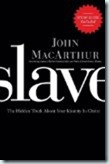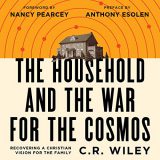Slave

When reading the rules to the game Othello, you come across the instruction that while the concept or rules are simple, the game will take a lifetime to master. The concept that this book starts out with is that Christianity has been hiding a very valuable truth: That the Bible is requiring that followers of Christ are actually his slaves.
John MacArthur argues in this book that the term that the Apostle Paul uses of himself over and over in the New Testament isn’t “bondservant” but “slave.” This certainly gives a new ring to favorite passages. I mean, when’s the last time you heard someone say, “Well done, good and faithful slave?”
The concept, while jarring, is powerful in its application. MacArthur spends a good deal of time explaining the differences between what we’ve come to think of as slaves compared to what the historical reference would have been. A slave around the time of the apostles could be a place of high regard and little responsibility, except to do the will of the master.
In a way, this book reinforces the truths in Living As a Christian in that who we are and who we should please ceases to be those who we believe we should be pleasing. All of a sudden, dying to self and living for Christ makes perfect harmony with Christ’s sayings about hating one’s family—our entire reason for being is for Him.
The book is very laid out, yet I found that many times I had already reached some conclusions that he was taking longer to explain in order to find the foundation. It is not a long work, and like I said, the key is in understanding the main postulate—that we are slaves (owned ones) rather than bondservants (someone that owes a debt to another, and eventually will pay it off).
We have been bought with a price, and we are to glorify God.











